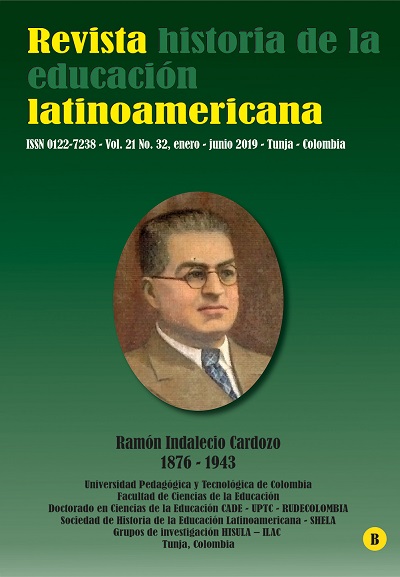Persecution on Clio. When neoliberal presentism reached humanities

Abstract
In recent decades, as a result of the accelerated processes of industrial, commercial and communication modernization, different pillars that had sustained modern societies for centuries have begun to form. These dizzying changes become even more drastic when they impact on developing societies because of their mechanisms of stabilization and structural strength are precarious, unequal and weak.
Starting from the situation of the Latin American panorama, these impacts are also felt in higher education, especially in the teaching of social sciences, seen in the past as a strengthening element for the analysis and interpretation of human phenomena. History, particularly, as a resource of awareness and time. But it has not been the only one resenting the silent and discreet but at the same time forceful and crude attacks of a presentist disciplinary modernity that has been displacing and re-funcionalizing curricula, professions, as well as spaces and, especially, the paradigms of the social sciences and the humanities. This, in order to insert disciplines from the field of natural, exact, and administrative sciences as alternatives and univocal purposes to give greater emphasis to contemporary university education.
The present text addresses the problem of universities, taking Mexico and in particular the University of Guadalajara as a reference. The starting point is a panoramic view of the consolidation of the humanities. History is taken as a paragon discipline along with those who were the first teachers. The difficult and painful trajectory of the construction of its paradigms is historically cleared until the point when teaching and research efforts achieved professionalization and the legitimization in Mexican universities.
However, in the last 25 years, approximately in a vertiginous and multifactorial manner, restrictive policies have been implemented to reorient budgets, programs, schools and models in accordance with the new paradigms, based on an academic neoliberalism and whose slogan is productivity, profitability, efficiency and therefore; the creation of scenarios that allow these ends. This issue has affected the social sciences. We offer here a brief account of the events that have affected many areas with respect to users, curricula, and careers.
The method of exposition of this essay is based on a series of evidence and documentary and bibliographical experiences from the humanistic trajectory and construction, as well as from the influences and implications of the neoliberal presentism
Keywords
University; social sciences; history; neoliberalism; curriculum.
Author Biography
Armando Martínez Moya
Doctor en Historia, actualmente profesor de la Universidad de Guadalajara – Mexico, es integrante del grupo de investigacion Historia y prospectiva de la Universidad Latinoamericana – HISULA de la UPTC.
References
Barba, Francisco Esteve. Historiografía Indiana. Gredos. Madrid. 1992. Ramón Iglesia. Cronista e Historiadores de la conquista de México. México. 1972.
Barragan Santana, Silvia Lorena. Et al. Democracia y soberanía nacional. BGC. (Ediciones Escolares de Occidente. Guadalajara. 2015).
Bermejo, Luz. ¿Es lo que conoces o a quién conoces? El mercado laboral y el proceso de inserción laboral de egresado de Estudios Políticos y Gobierno de la Universidad de Guadalajara. (Universidad de Guadalajara. México. 2010). Salvador Gutiérrez González. Historia particular de la Facultad de Ciencias Químicas de la Universidad de Guadalajara. Ediciones del autor. (Guadalajara. 2008).
Cansino, Hugo. Et al. Miradas desde la Historia Social y la Historia intelectual. América Latina en sus culturas: de los procesos independistas a la globalización. U.C. Córdoba/ U. Veracruzana. México. 2012.
Cano, Gabriela. La Escuela Nacional de Altos Estudios y la Facultad de filosofía y letras. 19110-1929. En: González G., Enrique. Coord. Estudios y Estudiantes de Filosofía. UNAM. México. 2008.
Cuño Bonito, Justo. Reforma Y Contrarreforma de la Enseñanza Primaria Durante La II República Española Y El Ascenso Del Fascismo (1932-1943). Revista Historia de la Educación Latinoamericana vol. 15 no. 21 (2014): 89-106.
https://doi.org/10.19053/01227238.2468.
García Yépez, Janette, Rodríguez R, Pedro. América Latina y la visión de los otros: breve revisión crítica de la historiografía latinoamericana. http://www.ub.edu/histodidactica/images/documentos/pdf/america_latina_vision_otros_revision_historiografia_latinoamericana.pdf.
González, Rubí; Guillermo, Mario. La educación superior en los sesenta: los atisbos de una transformación sin retorno. Revista Sociológica. no. 68. Sep-dic. (2016):15-59
González López, Blanca Azucena. Francisco Javier Lora Velázquez. Ciudadanía Mundial. BGC. (Ediciones Escolares de Occidente. Guadalajara 2015).
Guerra, Yolanda M. “¿Las humanidades en crisis o la crisis de la humanidad?”. Revista Educación y Desarrollo Social. vol. 2 no. 2. (2008).
Hernando Gómez, Jairo Esteban. Las tribulaciones de la enseñanza en ciencias sociales. Palabra Maestra. http://compartirpalabramaestra.org/columnas/las-tribulaciones-de-la-ensenanza-de-las-ciencias-sociales
Ibáñez Fanés, Jordi. El reverso de la historia, (Calambur, Barcelona. 2016)
Martín Descalzo, José Luis. Apartado 31. Una fábrica de monstruos educadísimos. En: Razones para la alegría. Ediciones Sígueme. Salamanca. España. 2008.
Martínez Moya, Armando. Una Red atrapada por otra: El Trasfondo Instituyente de la Universidad de Guadalajara. Ponencia: presentada en el VI Congreso Internacional sobre Historia y prospectiva de las Universidades de Europa y América. Tema: “El futuro de la Universidad Latinoamericana a debate. Desafíos y nuevas perspectivas. Universidad Pedagógica y Tecnológica de Colombia., Tunja, 11, 12 y 13, octubre de 2016
Mendoza Cornejo, José Cesar. Historia de la División de Ciencias Biológicas y Ambientales. (UdG. Guadalajara. 2005).
Mendoza, Javier. “Vinculación universidad-necesidades sociales.” Especialmente: “La Universidad como conciencia”. En: Ricardo Pozas. (Coord.). Universidad nacional y sociedad. (UNAM. México 1990), 365-370.
Mejía Velill, David. “Crisis y porvenir en las humanidades en la universidad actual”. Revistas Pensamiento y cultura. no 1. Bogotá. (1998).
Molina Bravo, José. “Educación Pública, Autonomía Universitaria y Cambio Político: Notas para el Análisis Del Movimiento Universitario en Chile, 2011”. Revista Historia de la Educación Latinoamericana vol.15 no.21 (2014): 263-82.
https://doi.org/10.19053/01227238.2473.
Muria, José María. “El Dr. Alberto Ladrón de Guevara.” Folleto de autor. S/f. (publicado por la muerte del Dr. L. de Guevara en 1978.
Ordaz López, Lidia Rosa. Algunas reflexiones sobre la Historia como ciencia y el conocimiento Histórico. Contribución a las Ciencias Sociales. http://www.eumed.net/rev/cccss/08/lros.htm
Zorrilla, Margarita. “La educación secundaria al filo de la Reforma”. REICE. vol. 2. no. 1. (2004).
